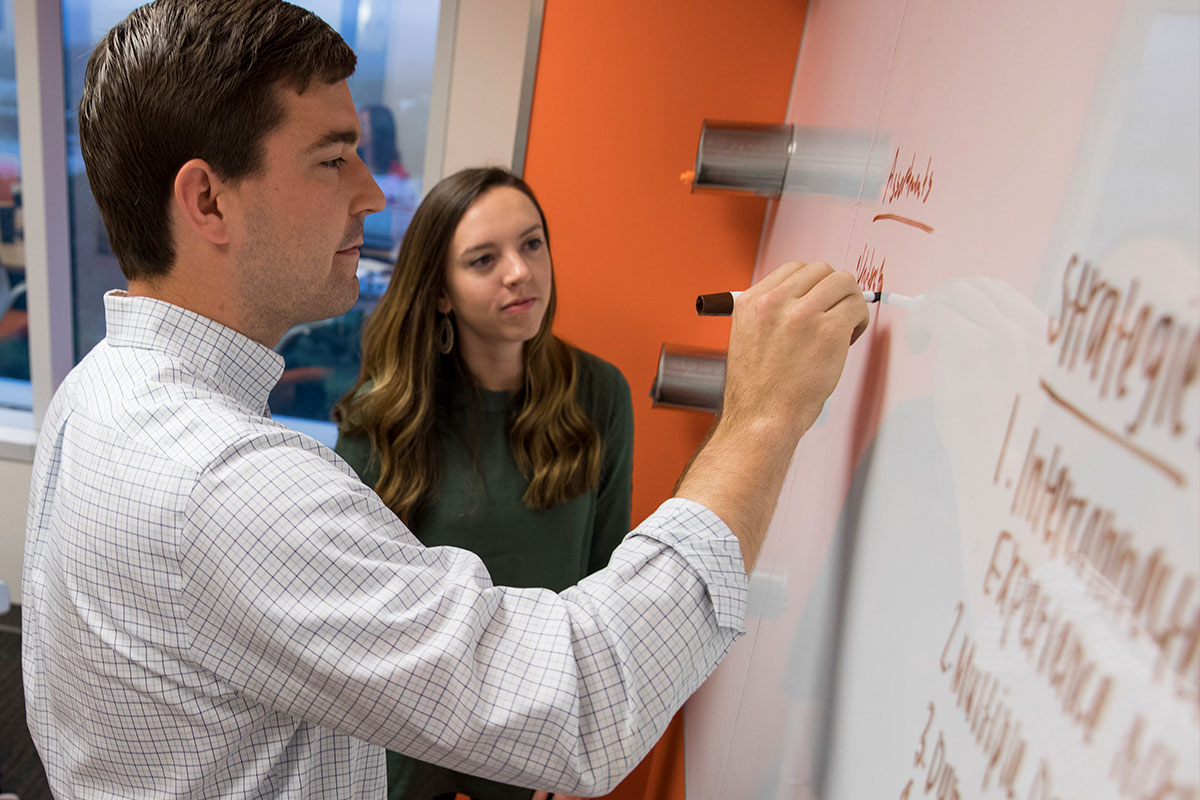5 Tips for Leading Your Student Intern to Success
This academic year, I have had the privilege of leading our Career Development Internship program here in the Career Center. In this program, our group of six undergraduate student interns are trained in the basics of career development concepts and service offerings – for example, they help us with resource creation, and staffing our daily drop-in hours for resume and cover letter reviews and other career-related quick questions. Although our internship happens to be specifically focused on career development, anyone who manages a student intern in any department is providing a career development experience. In this blog post, I have compiled some thoughts on ways you can maximize your student interns’ experience and lead them to success in your internship and beyond.
Integrate your intern into the organization.
Your intern will provide more valuable contributions when they have an understanding of organizational and team mission and goals, your priorities and expectations as their supervisor, and how the work they’ll be doing fits into that bigger picture. Provide a robust training and introduction period for your intern – they’ll be more engaged if they feel confident with their workspace, with the people in your organization, and with a full understanding of your organization’s purpose, services, and operational structure.
Things you may want to incorporate in your intern’s training:
- Office tour, show them their workspace, and quick tutorial of items like copy machines, phone systems, office supply locations and procedures.
- Introductions to team members with whom they’ll be working.
- Your own expectations, working style, and communication preferences as their supervisor.
- Any needed keys, passwords, logistical information such as attendance and pay info, dress code, other office policies – written and unwritten, and office communication practices (e.g. listservs, other communication tools).
- Time to fully explore and understand how to navigate your website and any other software systems they’ll be utilizing.
- Organizational vision, mission, values, current goals and priorities.
- Projects upon which they’ll be focused and where those fit into office-wide and team goals.
- Permission to ask lots of questions!
Ask where they want to go and help them develop the tools to get there.
One of our division’s core values is Servant Leadership. Robert Greenleaf, founder of the concept of servant leadership in his essay The Servant as Leader, had a “best test” he proposed as a measure for servant leaders. According to Greenleaf, the first part of the “best test” of servant leadership is this: “Do those served grow as persons?” Even if your student intern is not sure exactly what he or she wants to do career-wise, you can help them understand how the skills they are developing inside and outside of the classroom are transferable across jobs and even industries. The National Association of Colleges and Employers’ list of Career Readiness Competencies can provide a starting point for these conversations. Have your intern reflect on the competency areas in which they have the most experience, and the competency areas in which they may have a gap in experience. For any gaps, work with them to identify tasks and projects that can help them develop in those areas. When relevant opportunities come up in your organization, advocate for your intern’s involvement.
Provide proactive feedback, and welcome their feedback, as well.
“Without feedback there can be no transformative change.” – Brene Brown, author of Daring Greatly
TriNet, an HR consulting company, did a study of millennials’ engagement at work as it relates specifically to manager feedback. According to their findings, millennials are hungry for feedback that is ongoing, specific, and thoughtful. Clear expectations and regular communication about situations in which your intern is meeting and exceeding those expectations, or not meeting the expectations is crucial in your intern’s development. Sharing specific instances and providing in-time feedback is key. For situations in which your intern is not meeting expectations, working together to identify alternative ways in which the intern could approach the task and remaining positive and solutions-focused can boost performance and enhance trust and engagement. We all want to know how we’re doing! In her book, Daring Greatly, Brene Brown offers some great strategies for what she calls “engaged feedback.”
Seek your intern’s feedback, as well, by asking questions about their experience and training process and how you could make the experience more impactful for that intern and future interns.
Encourage them to reflect – they won’t always do so without prompting!
“You don’t learn from experience. You learn from reflecting on experience.” –Ken Bain, Author of What the Best College Teachers Do
It is not enough for a student to have a great internship experience – they must be able to articulate the value and relevance of that experience in a resume, cover letter, personal statement, networking situation, or interview. Prompt your intern to think about the ways in which the work they’re doing for you incorporates the concepts they’re learning in the classroom, and challenge them to identify ways in which the skills they’re forming and developing translate to career readiness. Encourage them to pinpoint and discuss specific examples in which they’ve exemplified these skills in your internship and beyond.
Providing regular check-in meetings, and mid-point and closing evaluations in which the student is responsible for self-assessing is a best practice. Giving them the opportunity to share and/or present their projects is another great method for encouraging reflection.
Help them boost their support team.
Help your intern recognize the value of boosting their network of support and professional insight. Have they met their college-specific career consultant at the Career Center? Each consultant has at least 4 hours a week of drop-in hours purely dedicated to quick 10-15 minute consultations with students from their assigned academic college(s) or majors. Does your intern attend their favorite faculty members’ office hours? Have they done informational interviews with professionals in their field of interest? Do you have contacts with whom you could connect them for these? Have they tapped into the other resources available to them for free here on campus to help them develop personally? Here are just a few examples: CAPS for psychiatric counseling; the Aspire Clinic for financial, nutritional, legal, personal and relationship counseling; the Ramsey Center for fitness center and resources; and the Center for Leadership and Service for leadership education and connection to community through service. More can be found here: https://www.uga.edu/students.html
Intentionally supporting our student interns’ development will not only maximize their ability to make meaningful contributions to our organizations, but more importantly, it’s a great way to ensure we’re serving those we’re leading!





